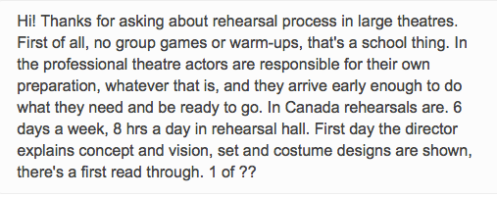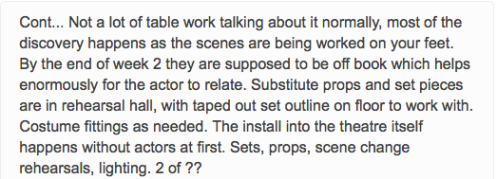What could it be like, rehearsing The Crucible? Two theater professionals answer
This was fascinating to read. First, from an answer delivered via tumblr messaging.
And a second answer, from Linda60:
I would say that they started with reading rehearsals with the whole cast and staff in attendance. They usually take about 1-2 days, depending on how long the text is. In our theatre the rehearsals are customarily divided in 2 times 4 hours per day (10.00 – 14.00 and 18.00 – 22.00) when the actors do not have to be on stage for a performance in the evening. Alternatively there is only a morning rehearsal, as there has to be an intermission for the actors of at least 4 hours between a rehearsal and an actual performance. Rehearsals can also be scheduled during the day with short intermissions. But still they should not last longer than 6- 8 hours. The actors need time to learn their text (esp. possible text modifications) and to let all the discussions, impressions and rehearsed scenes sink in.
If a director has a (more or less) clear idea about what the final play should look like (which is somehow desirable but not always the case and can make the process quite often a bit less stressful for all the participants), he/she would’ve already decided with his/her assistant(s) about a detailed schedule for each and every actor for a week in advance. They should have Sundays off!!
(I’m talking of Germany here with it’s special kind of theatre tradition with a really large number of municipal theatres or state theatres.)
Above all it is a huge cast (26 actors!!) in “The Crucible“ on a relatively small round stage and I would assume this is one of the challenges that this production faces, to get them all “choreographed“ on and off stage without everybody being constantly running and moving which can be very distracting and confusing for the audience sitting so close around.
BTW as you all probably know, other than in film productions, in theatre the scenes are rehearsed in “chronological“ order.
Measuring the actors is one of the first things they have to get done, usually before they start with the rehearsals. The original costumes are normally ready for the first proper stage rehearsals, about 2 weeks before the “premiere“. It seems they have less than a week to rehearse on the original stage as the current production runs till June 15th. In this relatively short time until June 21st they have to get ready with most of/all the technical and lightning setups and to get the actors at the right place where the spotlight is…. 😉
Well, these are my ideas about this…. Maybe it’s totally different at the Old Vic….








Thank you so much for the interesting insight!
LikeLike
Thanks, very interesting!
LikeLike
These were very interesting to read and insightful, thank you Linda and anon. Far from just turning up and speaking the lines, the whole process of putting a play onto stage seems to be a more-than-full-time job. I assume that learning the lines is up to the performers themselves? So another couple of hours added per day? I wonder how they do it. It seems like an extremely intense job to me…
LikeLike
I was thinking: that means he knows his lines by now … time is passing quickly.
LikeLike
Sehr erkenntnisreich. Bin so gespannt auf das Ergebnis! Und klar er hat den Text 100% schon drauf – mein Lieblingsstreber 🙂
LikeLike
Thank you both for sharing your knowledge with us. It brings me so much closer to the whole process when I understand what challenges are involved.
LikeLike
Thanks for sharing! That was VERY interesting to read and gives a daunting insight of his working days.
LikeLike
Thank you so much both of you. The process is fascinating and you can see how stressful it can be and often is I’m sure. There is a lot going on and so much to get down before that opening night. I was wondering about the understudy. Do these people rehearse separately? They have to know the whole thing just in case right?
LikeLike
[…] […]
LikeLike
Anonymous said this on May 29, 2014 at 2:06 am |
Thanks for sharing these interesting insider informations. For me as a total theatre ignorant (shame on me) the whole process seemed to be a book with seven seals. Knowing how many work is involved to bring a play on stage will raise my appreciation, admiration sky high 🙂
LikeLike
Thank you both for sharing, as usual the insight into what goes on behind the scenes fascinates me.
LikeLike
Very interesting. I have tickets for the first performance of a week – oh well!
LikeLike
We have tickets for the Saturday night after his birthday – hope to get a glimpse of him afterwards. Anybody out there that also has tickets for the same night?
LikeLike
I suspect the best place to look for meetups is possibly on the fan forums?
LikeLike
The way it’s done in Canada is the way it’s done in the US and I suspect the UK. We learn our lines outside of rehearsal, but the process of working with castmates and director while figuring out the blocking (where you stand/sit and when/where you move) while on book (holding script) helps to cement the lines in those 1st 2 weeks. Still, you usually memorize the bulk of the text away from rehearsal. Some actors get help from significant others, friends, family, roommates (they’re on book–holding script and giving you your cues). Others record lines in robotic, uninflected voice and play them back while driving, etc. Uninflected voice prevents “line readings,” aka saying same lines in exact same way every time instead of listening and responding truthfully to scene partner with the text. And many actors sit with the script alone and memorize the old fashioned, tried and true way. Hope this makes sense.
LikeLike
Thanks for the comment, and welcome! Armitage has added (in the “Bin Weevils” interview, 2012) that he doesn’t find it hard to learn lines; he says he thinks of a series of images as a memory device. (Of course, I find this interesting because it’s in direct relationship to ancient mnemonic techniques / ars memorandi).
LikeLike
Thanks for this, it’s very interesting. 🙂
LikeLike